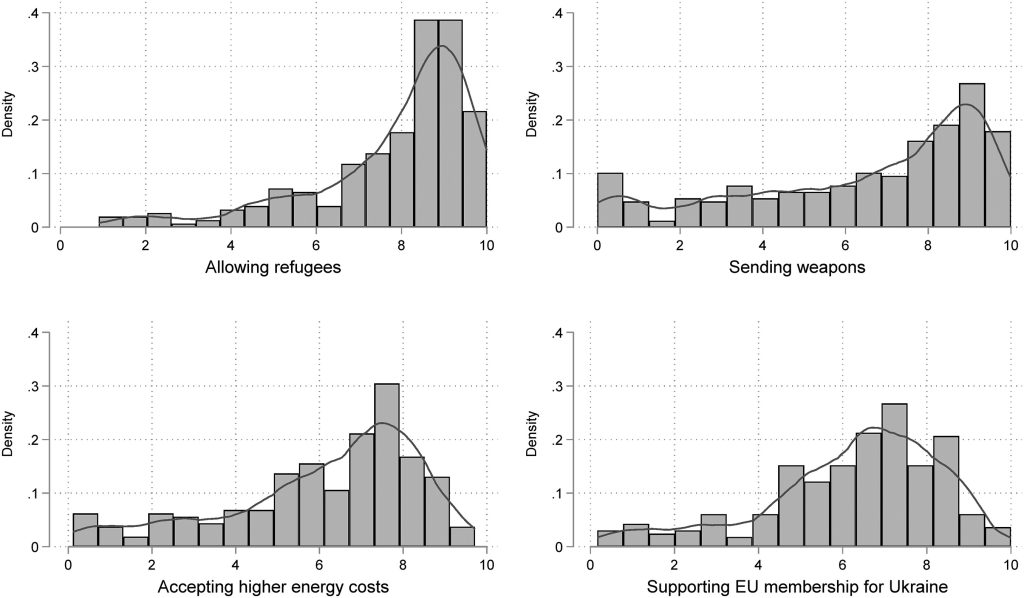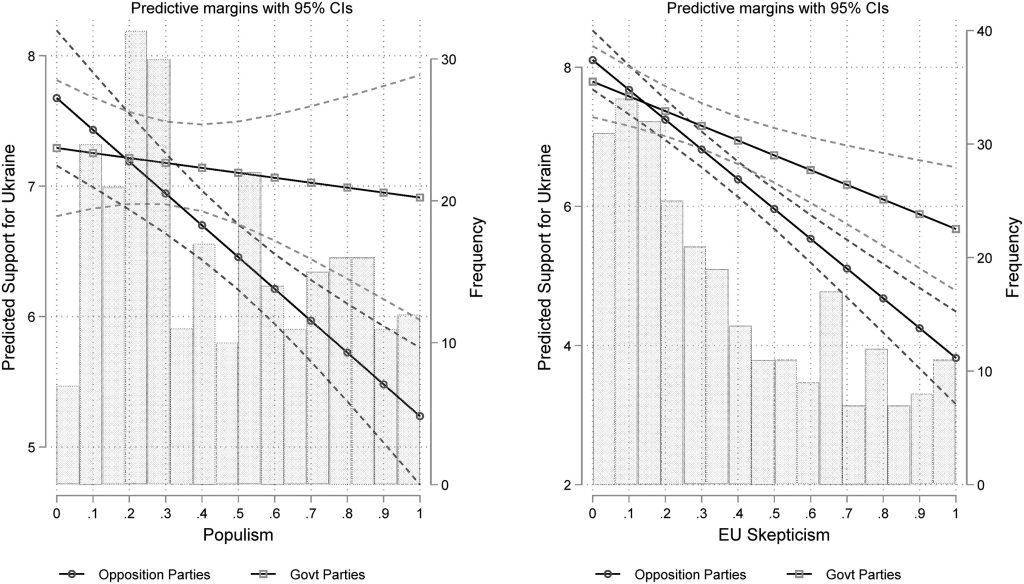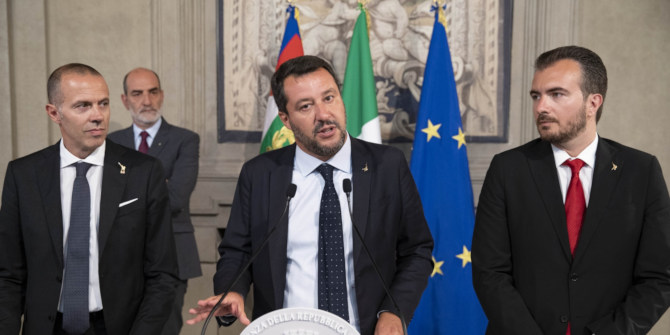Support for Ukraine has been strong across Europe, but it is far from uniform. Drawing on a new expert survey, Ryan Bakker, Liesbet Hooghe, Seth Jolly, Gary Marks, Jonathan Polk, Jan Rovny, Marco Steenbergen and Milada Vachudova show that populism and scepticism about the European Union explain much of the variation in support for Ukraine.
Russia’s full-scale invasion of Ukraine in February of 2022 shattered the post-Cold War illusion that Europe is free from war. Many political actors spoke in favour of Ukraine, producing a rare sense of European unity. But not everyone is eager to send weapons to Ukraine, welcome refugees from the conflict zone or accept higher energy costs associated with the sanctions placed on Russia in the attack’s aftermath. This raises a question of what determines political actors’ support of Ukraine.
In spring 2023, CHES fielded a survey asking hundreds of political scientists specialising in party politics, European politics or security studies to place the political parties in their country of expertise on different measures of support for Ukraine. More specifically, we asked about the parties’ willingness to allow refugees from Ukraine, send heavy weapons to Ukraine, accept higher energy costs and support Ukrainian membership of the European Union. The first and most important finding from our study is that a majority of political parties across Europe support Ukraine, visualised in Figure 1.
Figure 1: Distribution for the four kinds of support for Ukraine
Note: We plot the distribution of support among 269 parties for each of four policies with respect to Ukraine. The distributions are kernel Epanechnikov with bandwidth held constant at 0.5. Higher values on the x-axis represent more support for Ukraine. For more information, see the accompanying paper in European Union Politics.
Yet, as is also clear from this figure, a non-trivial tail of opposition exists. Of the 269 parties surveyed, 97 reject one or more of the four measures of support for Ukraine. How should we understand this variation in party positioning?
In a recent study, we develop four expectations about which parties do or do not stand with Ukraine. First, drawing from foundational literature in international relations and political psychology, we posit that parties from countries sensing threat due to historical legacy or geographical proximity to Russia are more likely to support Ukraine. Countries that were occupied and (partially) annexed by the Soviet Union during World War II have more reason to be concerned about Russian revanchism than others, while countries that border Russia (or Ukraine) may also perceive a greater threat. The party systems of these countries should reflect this.
A more nuanced argument asserts that the underlying political ideology of a party should matter as much if not more than perception of threat from Russia. We focus on the “thin ideology” of populism and the thicker ideological feature of a party’s fundamental positioning on the European Union. We expect that political parties that rise to prominence by questioning the post-war political establishment, which includes traditional mainstream parties and international governance such as the European Union, are more likely to toy with aligning themselves with the Russian regime and are thus less likely to support Ukraine. In short, the more populist the party and the less a party supports the European Union, the less likely that party will be to support Ukraine in the face of Russia’s invasion and occupation.
Finally, we expect participation in government to moderate these effects. Government participation induces responsibility. We expect government participation to increase support for Ukraine, even among populist and anti-EU parties that are otherwise likely to show low support. Canonical political science work on coalitional politics and the trade-offs between attaining government office and maintaining policy purity suggest that parties frequently have incentives to moderate on policy positions that may undermine their coalition potential.
We examine these expectations in a quantitative analysis of our party-level survey data, controlling for several country and party-level features, including alliance ties with the United States, democracy, dependency on Russian gas, and parties’ economic and cultural ideologies. The analysis provides support for all four expectations. Figure 2 illustrates this for populism, opposition to the EU and government participation.
Figure 2: How government participation moderates populism and EU-scepticism on support for Ukraine
Note: For more information, see the accompanying paper in European Union Politics.
The left panel displays predicted support for Ukraine (vertical axis) for parties in government (light grey line) and parties in opposition (dark grey line) at different levels of populism (horizontal axis). The right panel does the same for opposition to the European Union. The slopes are much steeper for opposition parties than for parties in government. This reveals that populism and EU opposition significantly reduces support for Ukraine, but mostly among opposition parties.
These are striking and even counter-intuitive findings because prior research attributes much of the effect of EU-scepticism and populism to their association with the basic dimensions of political contestation on economic left-right and GALTAN. We find that populism and EU-scepticism are robust in the presence of these ideological controls.
Our study was completed in the spring of 2023, after the coldest months of winter in Europe but prior to Ukraine’s summer counter-offensive. Two years after Russia’s full-scale invasion and war against Ukraine, party-based support for Ukraine has likely declined somewhat since our survey. This makes it all the more important to understand what drives support (or its absence) for Ukraine among the political parties of Europe. The recent reversal of Robert Fico’s opposition to arming Ukraine upon attaining the Prime Minister’s office in Slovakia suggests that there is merit to our argument about the moderating effect of government participation.
For more information, see the authors’ accompanying paper in European Union Politics
Note: This article gives the views of the authors, not the position of EUROPP – European Politics and Policy or the London School of Economics. Featured image credit: CC-BY-4.0: © European Union 2023– Source: EP







The answer might be in the full paper, but I didn’t find it here: the actual motivations for supporting Ukraine (and not supporting as much other regions in a similar situation). My hypothesis : follow what the USA tell.